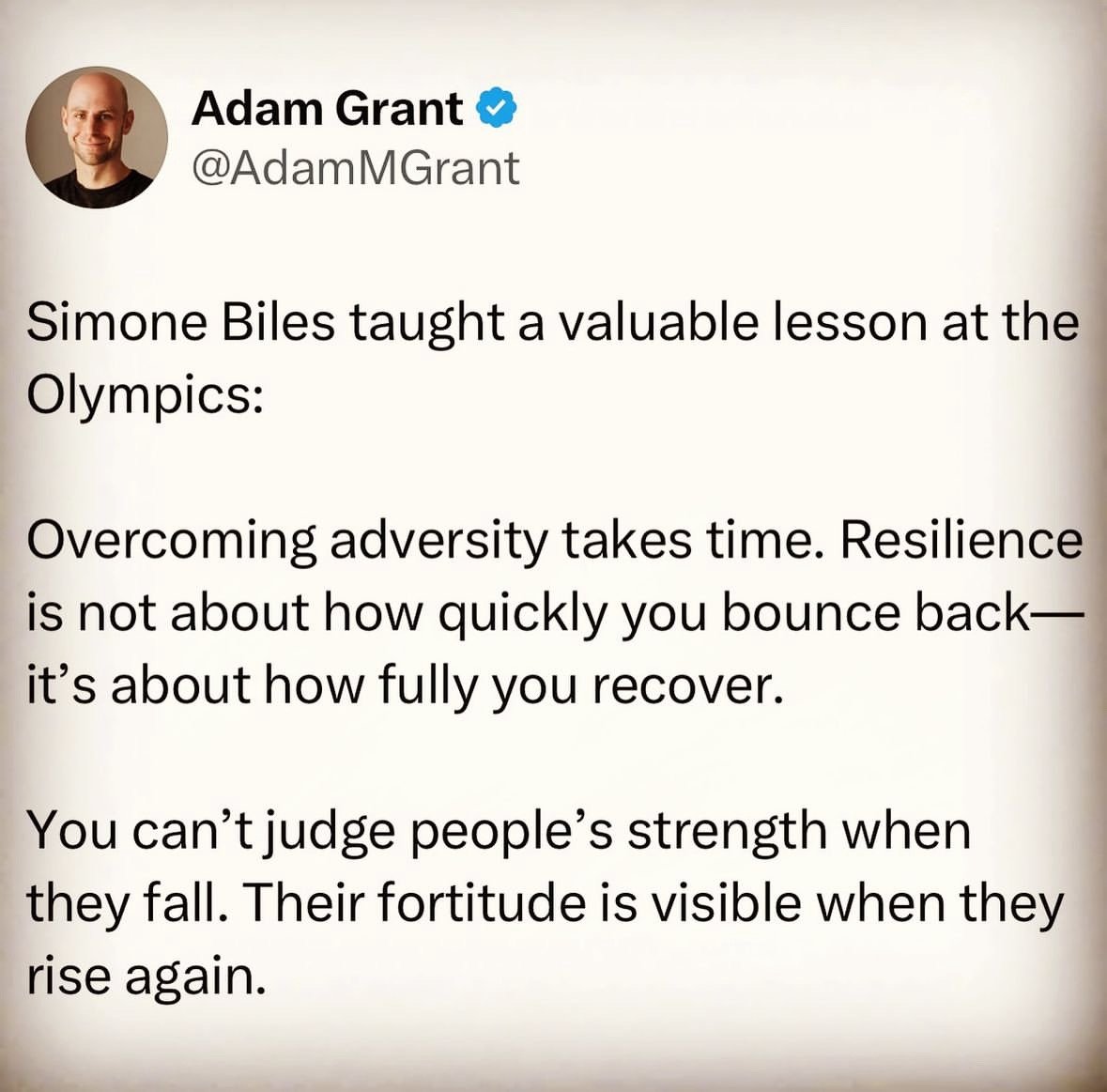Teaching and Learning Lessons from the Olympics: 🏅Insights for Nursing Education
From Pommel Horse Guy to a surprisingly endearing Snoop, the Olympics have been a constant background in my home for the past two weeks. There have been so many inspiring stories, great memes, and beautiful examples of sportsmanship and camaraderie.
I saw a post from one of my favorite authors, Adam Grant, about overcoming adversity, which got me thinking about the teaching and learning lessons we can learn from Olympic events. 🏅
Simone Biles taught us that overcoming adversity takes time.
Storytelling is Essential 📚
During a track and field event, I was in a hurry and fast-forwarded through the introductions and announcer commentary. I watched the race, but it didn’t feel as exciting. 🤷♀️ I realized I had skipped the storytelling section. Learning the athlete's stories creats an emotional investment in their event. It's not just about the race or the dive, but about the journey that led them there. This emotional connection gave me something to cheer for and is what makes the events so much more engaging. It's the 'why' and the stories of the obstacles they've overcome truly captivate us.
A writer develops an emotional connection to a storyline in the Olympics
When creating case studies or designing clinical experiences, we can intentionally craft the story. For instance, you can create a case study with a memorable patient in a unique situation, such as a patient with an interesting medical history or someone who demonstrates exceptional resilience. Or, at clinical, encourage students to learn their patients' stories through careful interview questions, such as asking about their personal life, hobbies, or what motivates them. Creating an emotional connection to the patient helps the learning 'stick' and builds a thread between the theory and nursing practice.
Embracing Progress over Perfection 📈
There were very few "perfect" performances at the Olympics. There were falls, missteps, and wobbles—even world-class athletes make errors. But time and time again, they got back up and kept going. They didn't let the fall define them. They cleared the mental hurdle and continued the work. And sometimes, an athlete's "average" performance still earned them a medal.
Progress over perfection illustrated as a necklace
Learning a new skill can make you feel silly, clumsy, and inept, bringing up all of the feelings of imposter syndrome. But I have found that when I make real progress, I take that awkwardness by the hand and move ahead anyway. I remember one of my very first clinical experiences. Our student group was at a long-term care facility, and my instructor asked me to put lotion on the hands of a one-hundred-year-old resident. I had never actually cared for a patient before, and I was terrified to touch or interact with her. At that moment, I could not see myself working as a nurse. And since then, nursing practice has not gotten easier - if anything, it has become more complex! Instead, we make incremental progress, grow our confidence, learn from our mistakes, and expand ourselves to fit the role. Learning is a process, not a one-time event. For ourselves and our students, daily, consistent practices will improve our performance beyond what we think is possible. Try to focus on the slow incremental progress instead of the unattainable perfection.
Explore Failure with Students 😔
Students often see a failed attempt as the end, and it can totally derail their progress and confidence. Help students to reframe a failure as a learning opportunity. In his book Hidden Potential, Adam Grant explores the world of polyglots—people who can talk and think in multiple languages. While this may seem like a natural ability, it seems quite the opposite. They did not learn these languages in childhood or take a secret course to unlock language mastery. Instead, they crossed a motivational hurdle and got very comfortable being uncomfortable. Grant found that those who could learn multiple new languages actively sought discomfort. They did not just accept minimal discomfort; they went out and looked for big, uncomfortable situations. One of the polyglots described trying to make 200 mistakes a day!
Failure is not in failed attempts, but in giving up.
So, learning becomes a paradox. We will not be comfortable with a skill until we master it, but in order to master it, we must practice. The discomfort of practice is necessary to achieve the comfort of mastery. And because practice can be uncomfortable, so we avoid it. Understanding and accepting this paradox is a key step in overcoming the fear of failure and embracing the learning process. Exposing yourself to failure requires courage. So be brave! And remember that everybody faces failure, even the Olympians.
Practice Caring (especially toward ourselves) 🫶
I had never watched women's rugby before the Olympics. But during the United States medal game, the announcer commented that their star player, Ilona Maher, had the largest social media following of any rugby player (men's and women's) in the world! So, obviously, I investigated.
One of the first reels I encountered showed her thanking her "past self" for scheduling a massage a few days after the match. While a professional massage sounds fantastic, what really intrigued me was that she anticipated her own needs. After a difficult task, give yourself a transition phase where you do something you love. You don't immediately need to move to the next thing. If you know two days of acute care clinical is physically and mentally draining, allow yourself a slow morning the next day. If you have a tough lecture session or a long meeting, caring for yourself could look like grabbing an iced coffee or stopping by your favorite bookstore on the way home. In the long term, anticipating your needs could look like planning a fun day at the end of the semester with your co-workers (for the extroverts!) or starting a puzzle (my favorite kind of puzzles HERE)that you usually wouldn't have time to sit and work on (for the introverts!). These self-care practices can help prevent burnout and maintain your passion for nursing education. Burnout is a complex topic. But learning to care for ourselves in a way that feels good is essential to counteract the high expectations and demands of our work.
Simone Biles states “mental health matters.”
Until 2026!
I just love the Olympics. 💜 Over the past weeks, they have been a source of inspiration, incredible stories, and so many life lessons. I can't wait to watch the winter version in two years!





